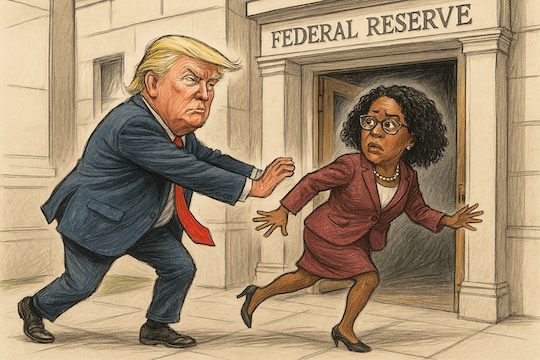
Posted July 30, 2025
By Sean Ring
Inside Private Banking’s Gilded World
I’m in New York teaching a course about Private Banking beginning this morning. As I was going through the material, I thought I’d give you some “inside baseball” on how and what banks do for their wealthy clients.
It’s a world with a difficult barrier to entry. Nowadays, you usually need between $3 - $5 million just to get in the door. But the services these banks provide are available to everyone, just not in a neat package.
So I’ll talk about those services so you can replicate them on your own, even if you don’t have seven figures in investible assets.
The Preface
After I left my job as a broker in London in 2006, I took a year off and then went into financial training. But in 2015, I stupidly returned to my old bank in a “talent development” role in Hong Kong. There, I got my first taste of private banking, something very different from what I had done in London.
Private banking services for high net worth individuals (HWNIs) and ultra-high net worth individuals (UHNWIs). After you’ve got about $3 million in investible assets - the cash left over after your primary residence and illiquid assets like art and classic cars - you’re an HWNI. After $30 million in investible assets, you’re a UHNWI. (Those numbers vary somewhat depending on the bank.)
Let’s open the kimono on this opaque world.
The Velvet Rope
“Rich people have rich people problems. They don’t have poor people problems, which are far worse. But they are problems nevertheless, that you, young banker, have to solve.”
I always open my class with those lines.
Private bankers are incentivized to offer seamless, all-encompassing solutions for their wealthy clients. In doing so, they often cultivate close relationships with their clientele—relationships where discretion isn't just a courtesy; it's part of the business model.
The Regulatory Dilemma: KYC and Source of Funds
Banks are legally obligated to follow Know Your Customer (KYC) protocols to prevent financial systems from becoming conduits for money laundering and other illegal activities. KYC verifies a client's identity, understands the nature of their financial activities, and assesses potential risks of unlawful behavior.
The most crucial aspect of KYC is identifying the source of funds. Where did the money come from?
Was it through legitimate business operations, investments, or inheritances? While the intent is to ensure transparency, this process often falls short in practice.
Why? Private banks are businesses first and regulators second. The temptation to onboard wealthy clients—especially those bringing massive deposits—outweighs compliance considerations.
For instance, Wealthy individuals often conceal their assets through shell companies, offshore trusts, and other vehicles.
In the cutthroat world of wealth management, refusing a client because their money seems “a bit dodgy” means losing that client to a less scrupulous competitor.
Bankers are also evaluated on their ability to attract and retain assets. When performance targets loom large, the incentive to look the other way grows stronger.
Now let’s look at the services private banks provide.
Asset Protection
One of private banking’s main attractions is asset protection, a broad category encompassing portfolio management, tax avoidance, succession planning, and philanthropy.
Once you’ve acquired this kind of wealth, you want to protect it through offshore trusts, companies, or foundations. This is about the legal structuring of your assets to make sure you can’t get sued out of them.
But under the umbrella of asset protection, much more happens.
Portfolio Management
“Where do we put all this money?”
Private banks offer customized investment strategies to grow clients' wealth. Whether diversifying into alternative assets like hedge funds or targeting emerging markets, the bank's role is first to protect assets and then grow them.
By this point, most wealthy families are looking to maintain their purchasing power by beating inflation. They’re not looking to own NVDA or TSLA to build wealth: those stocks are too volatile. Dividend-paying stocks and coupon-paying bonds.
The gray area arises when private bankers structure investments in opaque ways to minimize scrutiny. For example, some may recommend investments in offshore jurisdictions with lax reporting requirements, making it harder for tax authorities to understand the client’s portfolio.
Tax Avoidance (Not to Be Confused with Tax Evasion)
“How do I minimize my tax bill?”
When you grow up in the middle class, you realize your parents’ two biggest costs are the mortgage and your college education. Not so for the wealthy. Their biggest cost every year is tax.
One of the biggest draws of private banking is tax efficiency. Remember, tax avoidance is legal. Tax evasion is not.
Avoidance involves using loopholes and incentives within the law—think offshore trusts, holding companies, and dual-residency status.
Tax evasion involves failing to report income or using fraudulent methods to reduce tax liability.
Succession Planning
“Who gets my wealth, and how much do they get, when I shuffle off my mortal coil?”
Succession planning is another cornerstone of private banking. It ensures a client’s wealth is passed to heirs with minimal legal or tax complications. Private banks often structure trusts to transfer assets without going through probate (the courts), thus avoiding inheritance tax.
Burt Reynolds did this for his son when he died. The press reported that Reynolds left nothing for his son when he passed. That was a lie of omission. Reynolds set up a trust for his son so he could get Reynolds’ wealth tax-free. Thus, Reynolds’ will, which “left nothing” to his son, was a worthless piece of paper.
Philanthropy
“How do I get into Heaven despite all my wealth?”
Philanthropy is marketed as the ultimate noble endeavor in private banking. Setting up charitable foundations allows HNWIs to give back to society while enjoying tax breaks.
Some people set up cancer charities, some set up elephant charities. Now, private banks have entire departments dedicated to philanthropy.
Why Private Banks Are Tempted to Bend the Rules
HNWIs operate where influence, secrecy, and efficiency are paramount. They expect their bankers to deliver results without raising inconvenient questions. A client threatening to pull their funds could make even the most ethical banker hesitate before flagging a suspicious transaction.
Private banks derive significant income from assets under management (AUM). A single wealthy client contributes millions in fees annually. Losing that client over compliance issues directly hurts the bottom line.
The exclusivity and personal relationships that define private banking can foster a culture of collaboration. When clients and bankers dine, vacation, and engage in social circles, the line between professional and personal loyalty can blur.
In 2015, HSBC’s Swiss private banking arm helped clients evade taxes by concealing assets in secret accounts. Internal leaks showed that HSBC actively aided clients in circumventing tax authorities while turning a blind eye to suspicious activities.
In 2018, the Estonian branch of Danske Bank laundered over €200 billion through high-net-worth accounts. Weak KYC protocols and negligence were at the heart of the scandal.
Wrap Up
Private banking creates exclusivity. At its best, private banking offers asset protection, efficient tax planning, and legacy building.
But protecting your assets through offshore trusts and then wisely managing your portfolio, planning your taxes, structuring your succession plans in advance, and picking your charity are all available to you right now.
So, take a page out of the wealthy’s book and think about your wealth in this way. You may save yourself and your heirs a substantial amount of money.
But first things first.

A Money Pit That Saved Investors?
Posted August 29, 2025
By Byron King

A Philosophy For Living
Posted August 28, 2025
By Sean Ring

The Crowd’s Madness Saves Uncle Herschel
Posted August 27, 2025
By Sean Ring

The Fed's Cook is Goosed
Posted August 26, 2025
By Sean Ring

The Ascent of Ag in 5 Tweets
Posted August 25, 2025
By Sean Ring

